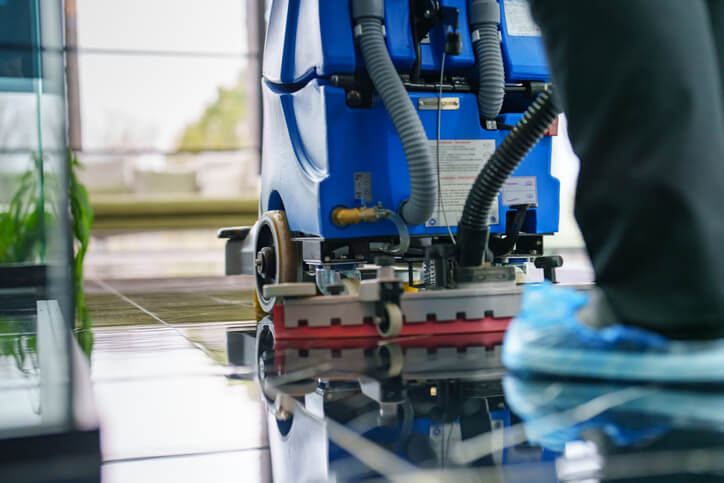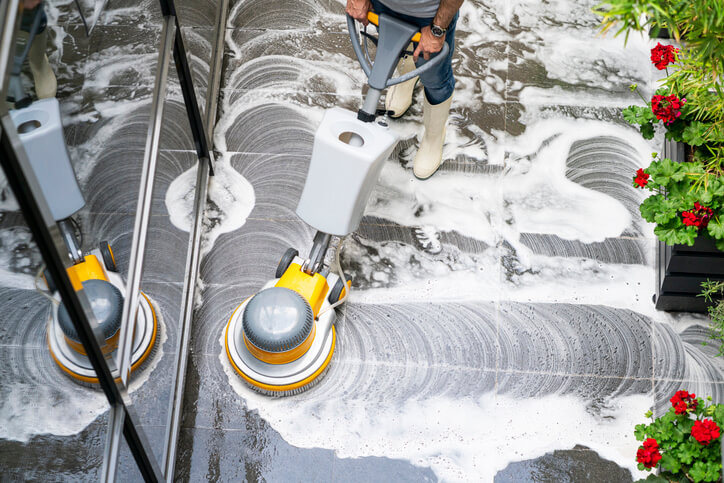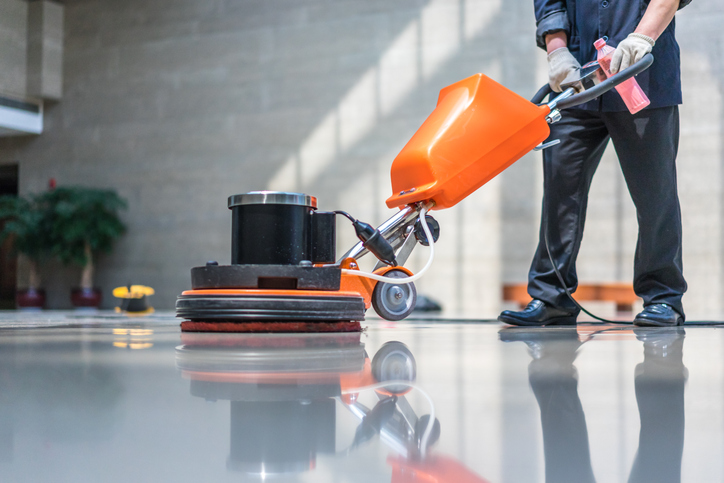Are you in search of a specialized cleaning service that can tackle the stubborn grime, grease, and dust build-up in large industrial spaces? If so, it’s time to consider hiring an industrial cleaner. This comprehensive guide will answer all your questions about what an industrial cleaner is and detail the wide range of tasks these professionals perform to keep industrial environments clean and safe.
What Is An Industrial Cleaner?
An industrial cleaner is a professional responsible for the upkeep and maintenance of large industrial spaces, which typically include manufacturing plants, warehouses, power plants, and factories. The role of an industrial cleaner goes beyond just surface cleaning; it involves maintaining the safety and cleanliness of environments where heavy machinery, chemicals, and extensive operations take place.
Unlike standard residential or commercial cleaning, industrial cleaning requires the use of specialized tools, techniques, and products. This is due to the nature of industrial spaces, which often contain hazardous materials, large equipment, and areas that accumulate significant amounts of dirt, grease, and grime. Industrial cleaners are trained to handle these challenges efficiently and safely, ensuring that the facility remains compliant with health and safety regulations.
Industrial cleaners are tasked with maintaining various parts of an industrial facility, including:
- Manufacturing and production areas. In environments where large machinery and equipment are operated.
- Warehouses. Spaces that store raw materials or finished products.
- Power plants. Facilities that generate energy and often require stringent cleaning standards.
- Office spaces. Including conference rooms and employee break areas within industrial settings.
- Locker rooms and employee lounges. Common areas used by staff.
- Storage areas. Spaces that may accumulate dust and require regular cleaning.
The Importance of Industrial Cleaning
Industrial cleaning is vital for several reasons. Firstly, it ensures that the work environment is safe for employees. Accumulated dirt, dust, and hazardous materials can pose significant health risks if not properly managed. Regular industrial cleaning helps prevent accidents and ensures compliance with safety standards.
Secondly, a clean industrial environment contributes to the longevity of machinery and equipment. Dirt and grime can cause mechanical parts to wear out faster, leading to costly repairs or replacements. By keeping the equipment clean, industrial cleaners help prolong its life and ensure it operates efficiently.
Lastly, cleanliness in an industrial setting can impact productivity. A clean and organized workspace allows employees to perform their tasks more efficiently, reducing downtime and increasing overall productivity.
The Skills Required for an Industrial Cleaner
Good Communication Skills
Attention to Detail
Physical Stamina
Mechanical Aptitude
Many industrial cleaning tasks involve working with machinery, either for cleaning purposes or as part of the cleaning process. Understanding how to operate and maintain this equipment is vital. In some cases, industrial cleaners may also need to troubleshoot or make minor repairs to the equipment they use.
What Does an Industrial Cleaner Do?
Cleaning Machinery and Equipment
- Boilers, tanks, and vats. These are often cleaned with high-pressure hoses to remove any build-up of residue.
- Conveyor belts. Regular cleaning prevents the accumulation of dirt that could affect the belt’s operation.
- Pipes and ducts. These areas require specialized cleaning to prevent blockages and ensure efficient operation.
Decontaminating Work Areas
Handling Hazardous Waste
Using Specialized Cleaning Equipment
- Power washers. Used for cleaning large surfaces and removing stubborn dirt and grease.
- Industrial vacuum cleaners. Engineered to manage substantial amounts of dust and debris.
- Mobile access platforms. Used to reach high areas that are not accessible from the ground.
- Chemical dispensers. For mixing and applying cleaning chemicals in the correct proportions.

Maintaining and Storing Equipment
Working at Heights
Some industrial cleaning tasks require working at heights, such as cleaning the exterior of tall machinery or the upper levels of a facility. Industrial cleaners are trained to use cradles, scaffolding, or mobile access platforms safely to perform these tasks.
The Tools and Techniques of Industrial Cleaning
Knowing what an industrial cleaner does is not enough, you also need to understand what tools they use to clean.
Commercial cleaning requires a different set of tools and techniques compared to regular cleaning services. The tools used by industrial cleaners are specifically designed to handle the demands of large-scale facilities and industrial-grade dirt and grime:
- High-pressure washing systems. High-pressure washers are essential for removing tough grime and contaminants from machinery and surfaces. These systems use water at high pressure to blast away dirt, grease, and other residues that regular cleaning methods cannot remove.
- Industrial-grade vacuums. Unlike household vacuums, industrial vacuums are built to handle larger volumes of dust, debris, and hazardous materials. They are often equipped with HEPA filters to ensure that fine particles are captured and do not contaminate the air.
- Chemical cleaning agents. Industrial cleaners use specialized chemical agents that are strong enough to break down heavy oils, grease, and other industrial residues. These chemicals must be handled with care and used according to strict guidelines to ensure safety.
- Abrasive blasting. Abrasive blasting, such as sandblasting or soda blasting, is a technique used to clean surfaces by propelling abrasive material at high speed. This method is effective for removing rust, paint, and other tough contaminants from surfaces.
Safety in Industrial Cleaning
Use of Personal Protective Equipment (PPE)
Industrial cleaners are required to wear personal protective equipment (PPE) to safeguard against the risks associated with their work. PPE may include:
- Gloves: to shield hands from hazardous chemicals and sharp materials.
- Safety Goggles: to shield eyes from harmful substances.
- Respirators: to protect against inhaling hazardous fumes or dust.
- Hard Hats: to prevent head injuries in environments where overhead hazards exist.
- Protective Clothing: to guard against skin exposure to dangerous substances.
Training and Certification
Hazardous Material Handling
Handling and disposing of hazardous materials are key aspects of industrial cleaning. Industrial cleaners are trained to identify hazardous substances, handle them safely, and ensure they are disposed of in compliance with environmental laws.
Why Should You Hire a Professional Industrial Cleaning Service?
Expertise and Experience
Compliance with Regulations
Cost-Effective
Customized Cleaning Plans
Professional cleaning services can develop customized cleaning plans tailored to the specific needs of your facility. This ensures that all areas of your facility are cleaned to the highest standards and that special attention is given to areas that require it.

Health and Safety Benefits
Choosing the Right Industrial Cleaning Service
We have figured out what is an industrial cleaner, what is left to figure out is how to choose a commercial cleaning company.
When selecting an industrial cleaning service, it’s important to choose a company with a proven track record of excellence. Consider the following factors:
- Experience in your industry. Different industries have different cleaning needs. Choose a cleaning service with experience in your specific industry, whether it’s manufacturing, energy production, or warehousing.
- Trained and certified staff. Verify that the cleaning service utilizes properly trained and certified personnel. This guarantees that the cleaners are knowledgeable about the specific challenges of industrial cleaning and are equipped to handle them safely.
- Reputation and reviews. Check the company’s reputation and reviews from other clients. A reputable cleaning service will have positive testimonials and a history of satisfied customers.
- Flexible scheduling. Industrial operations often run 24/7, so it’s important to choose a cleaning service that can work around your schedule. Look for a service that offers flexible scheduling to minimize disruptions to your operations.
- Eco-friendly practices. If environmental responsibility is important to your company, choose a cleaning service that uses eco-friendly practices. This includes the use of non-toxic cleaning chemicals and sustainable waste disposal methods.
Conclusion
Industrial cleaning is a specialized service that plays a critical role in maintaining the safety, efficiency, and compliance of industrial facilities. What does an industrial cleaner do? They perform a wide range of tasks that ensure your facility is clean, safe, and operating at its best.
From cleaning machinery and decontaminating work areas to handling hazardous materials and ensuring compliance with regulations, industrial cleaners are essential partners in the smooth operation of any industrial facility.
Hiring a professional industrial cleaning service Regency Cleaning Services in Calgary, ensures that your industrial space remains healthy, safe, and productive. With our expertise, advanced equipment, and commitment to quality, you can trust us to handle even the toughest cleaning challenges.
Contact Regency Cleaning Services today to learn more about how we can customize our services to meet the unique needs of your business.


